The article delves into the essential features of a hotel booking system, underscoring critical elements such as:
These components significantly contribute to operational efficiency and enhance guest experiences. Supported by data and expert insights, each feature illustrates how they collectively drive revenue growth and customer satisfaction within the competitive hospitality market. By understanding these key aspects, hotel and restaurant owners can effectively address their challenges and leverage opportunities for success.
The hospitality industry is experiencing a transformative shift, propelled by the growing demand for efficient and user-friendly hotel booking systems. As revenue projections surge and competition escalates, hotels must adapt by integrating essential features that not only enhance operational efficiency but also elevate guest experiences. This article explores ten critical functionalities that every hotel booking system should encompass, ranging from secure payment processing to advanced data analytics, ultimately raising the question: are hotels prepared to meet the evolving expectations of today’s travelers?
Lights On provides a comprehensive suite of essential for optimizing the hotel booking system. With key components such as:
These solutions are strategically designed to enhance financial performance significantly. In 2025, accommodation room revenue is projected to reach $197.48 billion, underscoring the importance of strategic pricing in capturing market share. By leveraging data-driven insights, accommodations can dynamically adjust their pricing strategies in real-time, ensuring competitiveness in a crowded marketplace. This proactive approach not only elevates occupancy rates—demonstrated by a 17.6% increase since the previous year—but also maximizes revenue streams.
Effective pricing optimization techniques, including:
are vital for establishments aiming to thrive in the evolving hospitality landscape. As industry leaders assert, effective pricing optimization transcends mere tactics; it is a necessity for sustainable growth in the hospitality sector.
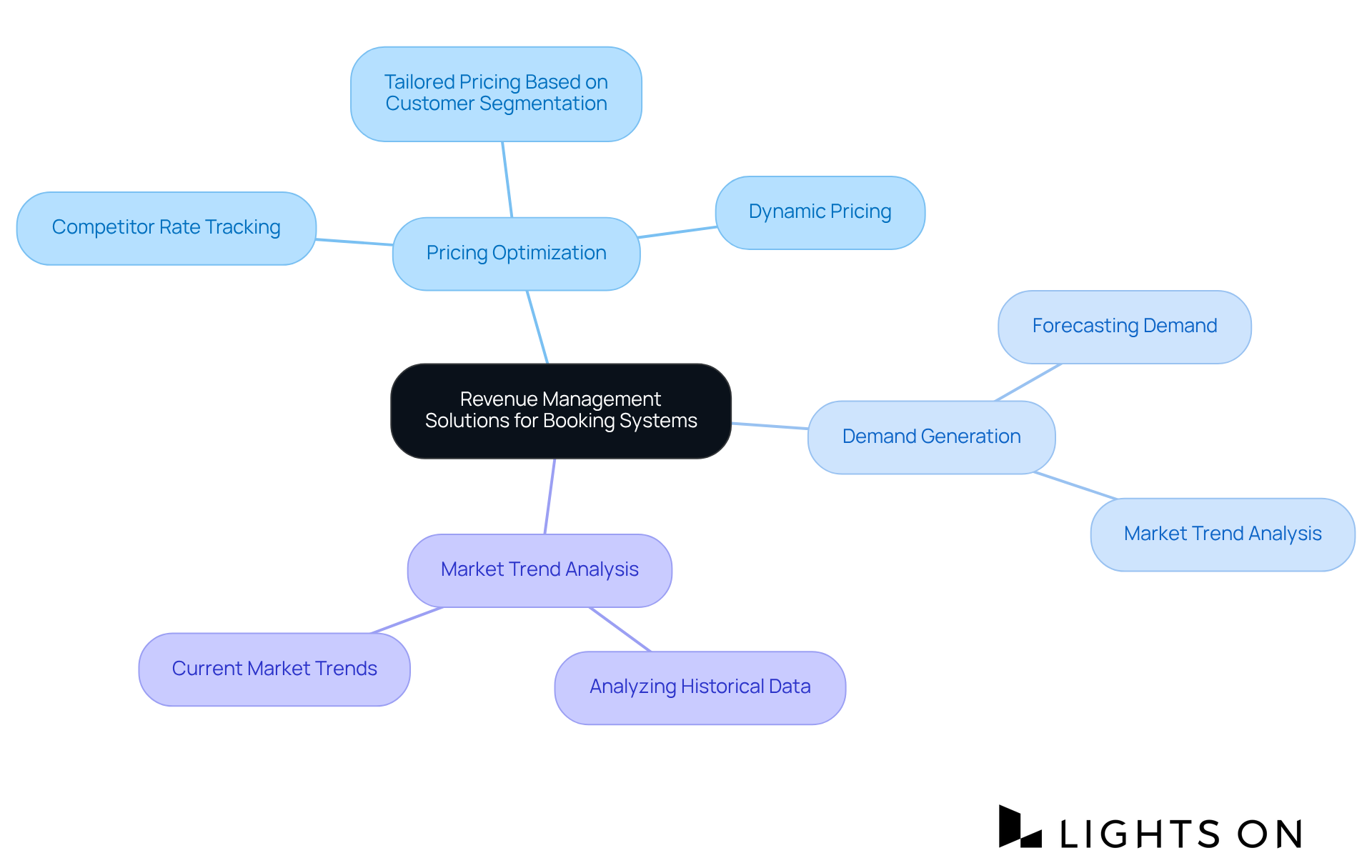
A robust accommodation reservation platform must prioritize secure payment handling to enhance visitor confidence. This essential feature guarantees that sensitive payment information is encrypted and safeguarded, significantly mitigating the risk of fraud. By offering a diverse range of payment methods, accommodations can cater to varied guest preferences, thus enhancing the overall reservation experience. Trust in the payment process is paramount; studies indicate that can enhance booking conversion rates by up to 30%, as noted in industry reports. As Kevin R. D. emphasizes, safeguarding customers’ financial data should be a top priority for hotel owners.
Furthermore, advancements such as EMV chip technology, which generates one-time-use codes for secure transactions, and multifactor authentication (MFA), which requires multiple forms of identification, are revolutionizing secure payment processing. These technologies ensure that transactions are not only safe but also seamless. Additionally, dependable technical support from payment gateways is essential for ensuring customer satisfaction and addressing payment problems swiftly.
In today's competitive environment, incorporating these secure payment options is not only advantageous but crucial for maximizing customer satisfaction and loyalty. Hotel owners should consider evaluating their payment gateway options to ensure they meet these security standards.
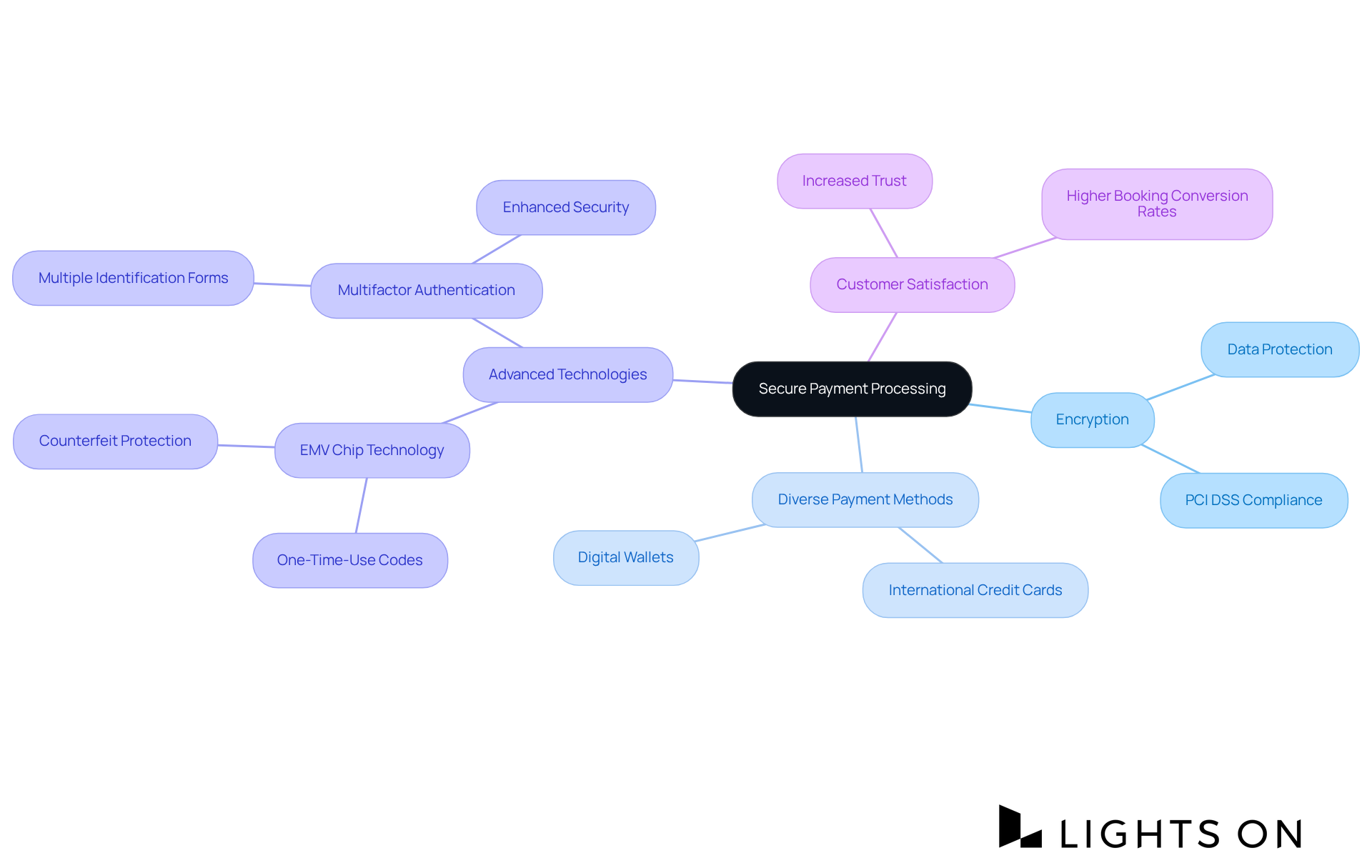
Integration features are crucial for the hotel booking system to operate effectively within the broader operational framework and to support marketing strategies that drive bookings. A hotel booking system that seamlessly integrates with property management systems (PMS) facilitates real-time updates on room availability, pricing, and visitor information—elements essential for successful marketing. This integration significantly , ensuring that all departments are aligned and can respond swiftly to marketing initiatives. As a result, accommodations can enhance operational efficiency and deliver an exceptional guest experience, which is vital for attracting and retaining clients.
For instance, establishments that have implemented high-quality reservation systems report improved data analytics and reporting capabilities, allowing them to monitor reservation trends and refine marketing strategies based on data-driven insights. Furthermore, industry experts emphasize that the right lodging software is not merely advantageous but essential for maintaining a competitive edge in today's market. By investing in a well-integrated reservation system, establishments can streamline operations, cultivate customer loyalty, and ultimately bolster their revenue streams.
Additionally, with online travel agencies (OTAs) charging commissions of up to 30% per accommodation unit, effective integration and direct reservations become increasingly critical for maximizing revenue.
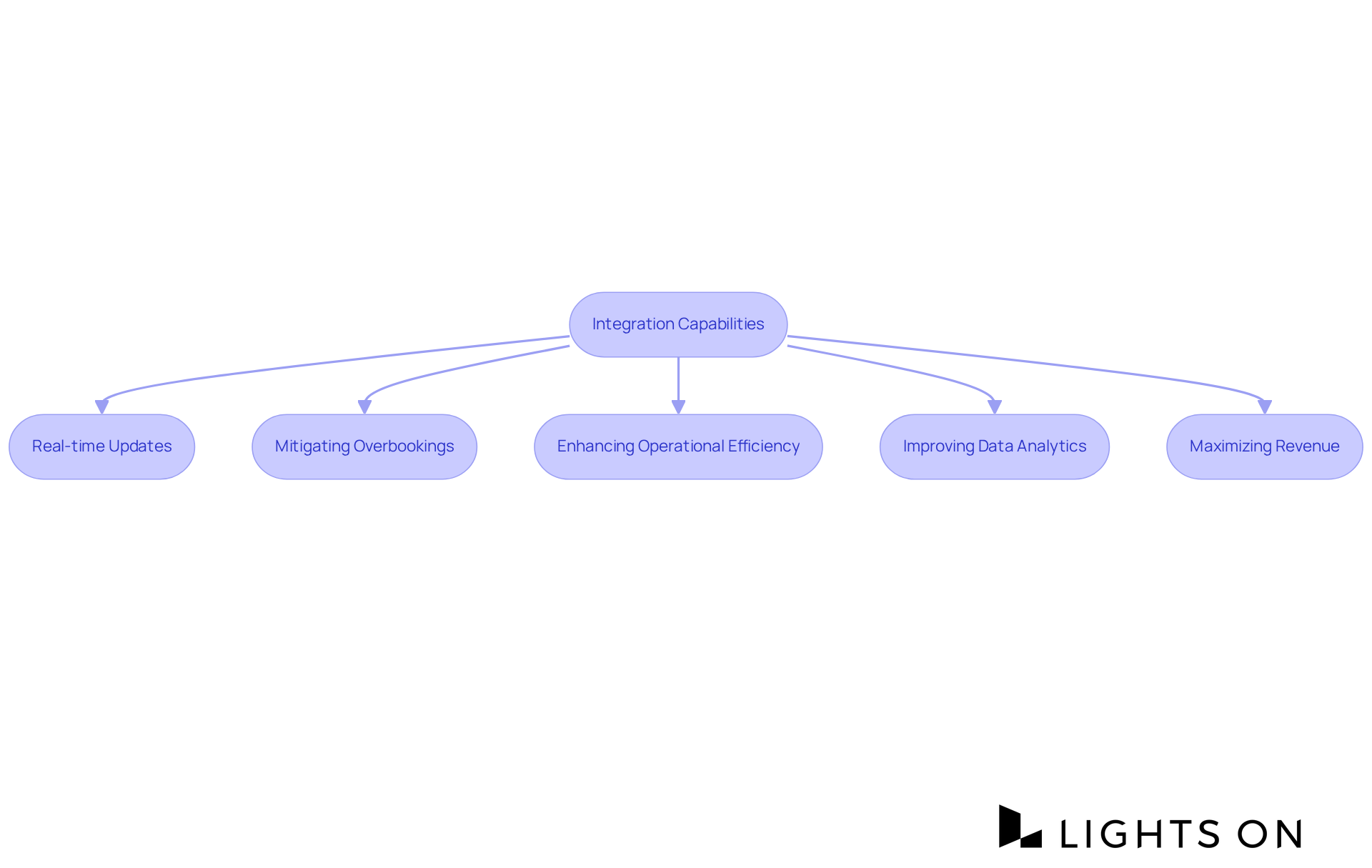
Real-time availability management stands as a pivotal element within any hotel booking system, ensuring that room inventory is accurately represented across all platforms. This capability is vital for preventing overbookings, which can lead to significant guest dissatisfaction and tarnish an establishment's reputation. By delivering immediate updates on room availability, accommodations can enhance operational efficiency and maximize revenue, particularly during peak demand periods.
Indeed, precise inventory management directly influences a property's financial performance; overbookings not only result in lost revenue but also negatively impact customer loyalty. As the lodging sector continues to evolve, leveraging technology for real-time inventory management becomes increasingly critical. This strategy enables establishments to sustain a while delivering exceptional guest experiences.
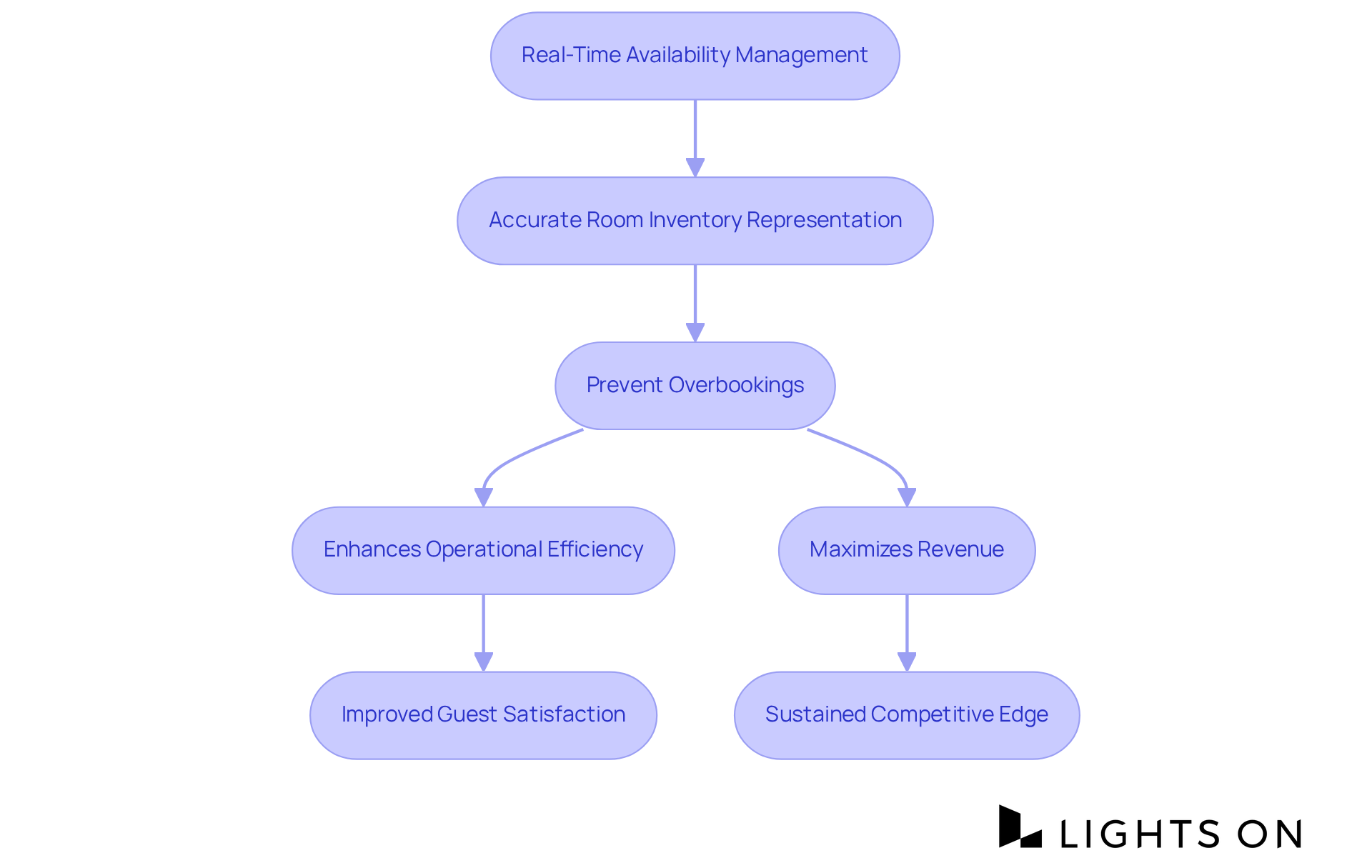
A hotel booking system that integrates robust marketing and upselling features can significantly enhance revenue potential. These attributes empower accommodations to implement targeted promotions and upsell additional services—such as room upgrades, spa treatments, or dining options—during the reservation process. By analyzing visitor information and preferences, accommodations can customize their promotional strategies, leading to improved visitor engagement and higher average reservation values.
Effective lodging marketing strategies, such as those advocated by Lights On, underscore that upselling can boost profits, with loyalty program members typically generating 12-18% more revenue per stay compared to non-members. Furthermore, personalized marketing messages resonate with 71% of consumers, who anticipate tailored experiences. This strategic approach not only enhances short-term revenue but also , making it imperative for establishments to leverage these capabilities within their hotel booking system.
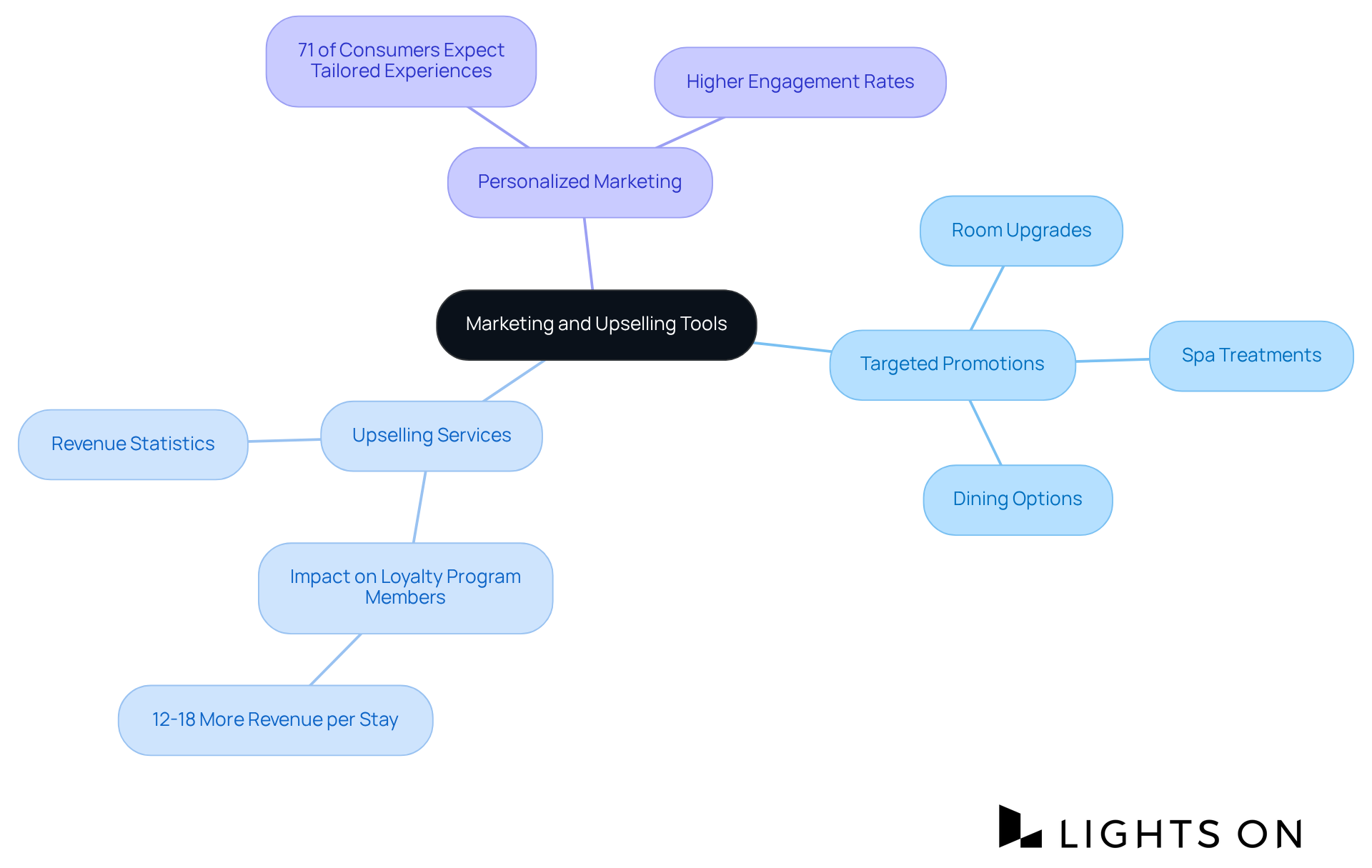
Data gathering functions within a hotel booking system are essential for gaining insights into visitor preferences and behaviors. By systematically collecting data on previous reservations, preferences, and reviews, the hotel booking system can enable accommodations to tailor their services to meet the unique needs of each visitor. This customized approach significantly enhances customer satisfaction, as visitors are more inclined to return to an establishment that recognizes and caters to their personal preferences.
To leverage this data effectively, property owners can implement , such as personalized email campaigns or customized loyalty programs that reward repeat visits. Furthermore, hotels that utilize visitor preference data can refine their loyalty programs within their hotel booking system, as tailored experiences lead to repeat reservations. In fact, loyal customers tend to spend 22.4% more and stay 28% longer than non-loyal customers, underscoring the financial advantages of understanding client preferences.
Expert insights suggest that employing data analytics not only enhances service personalization but also fosters stronger emotional connections with visitors, transforming them into brand advocates. As Richard Branson aptly states, the key is to set realistic customer expectations and then exceed them in unexpected ways.
As the hospitality landscape evolves, the ability to effectively harness visitor preference data will become a critical differentiator for establishments striving to thrive in a competitive market. Additionally, by 2024, 70% of guests are anticipated to prefer personalized offers, emphasizing the growing demand for tailored services within the industry.
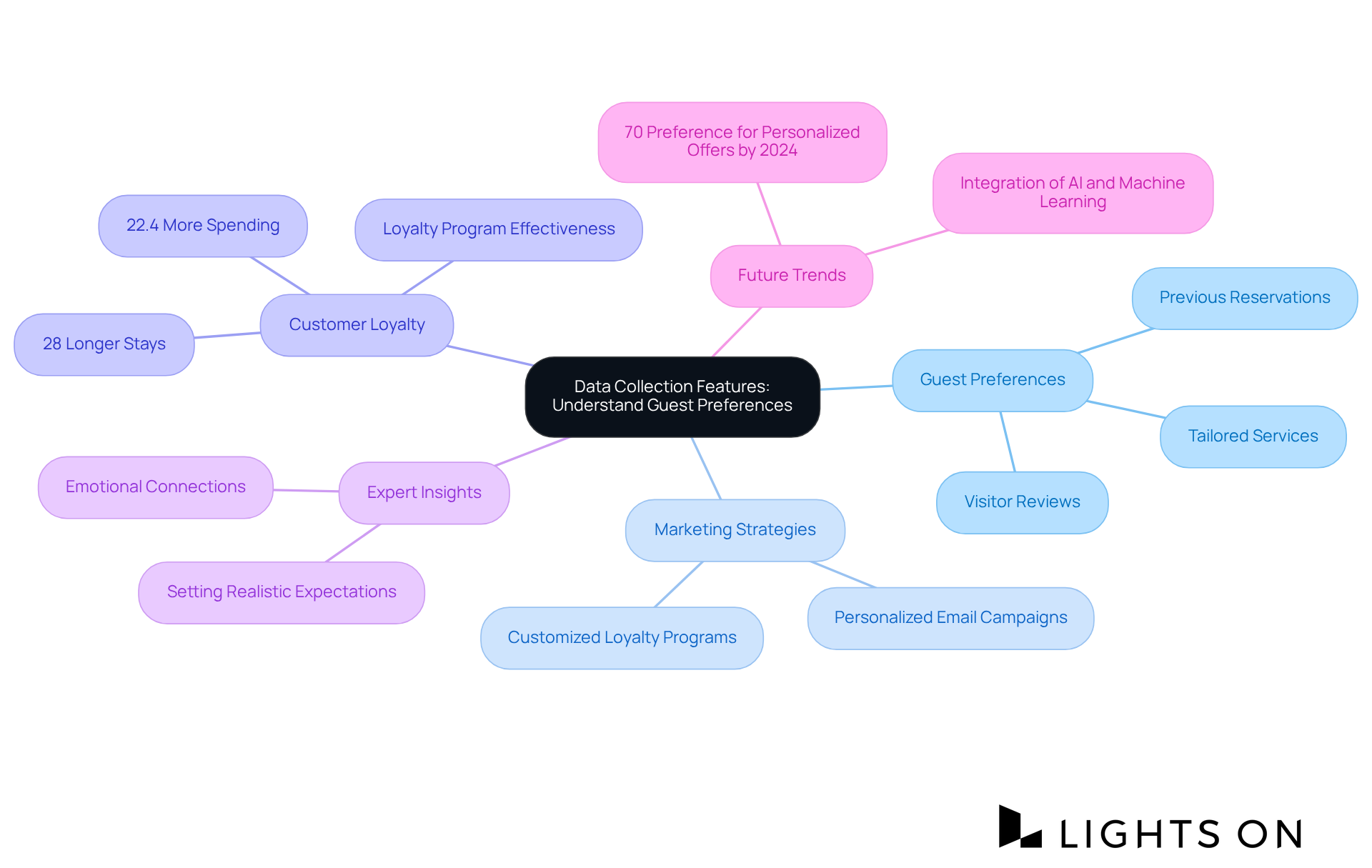
In today's travel environment, where mobile devices prevail, enhancing the hotel booking system for mobile access is crucial. A mobile-friendly interface enables users to navigate the reservation process effortlessly, regardless of their device. This optimization not only improves user experience in the hotel booking system but also significantly boosts conversion rates.
Studies show that accommodations featuring mobile-friendly reservation systems can experience conversion rates rise by as much as 30%, as patrons are more likely to finalize their reservations when the process is smooth and user-friendly on their smartphones. Industry leaders highlight that accommodating on-the-move travelers is essential.
As stated by SiteMinder, "This strategy corresponds with the industry's transition to a mobile-first approach, acknowledging the increasing number of travelers who favor the ease of reserving while on the go." Furthermore, 70% of consumers prefer mobile-friendly options, and 90% of travelers expect relevant information during their trip.
To execute mobile optimization effectively, property owners should consider:
By focusing on mobile optimization, accommodations can not only improve customer satisfaction but also increase reservation rates.
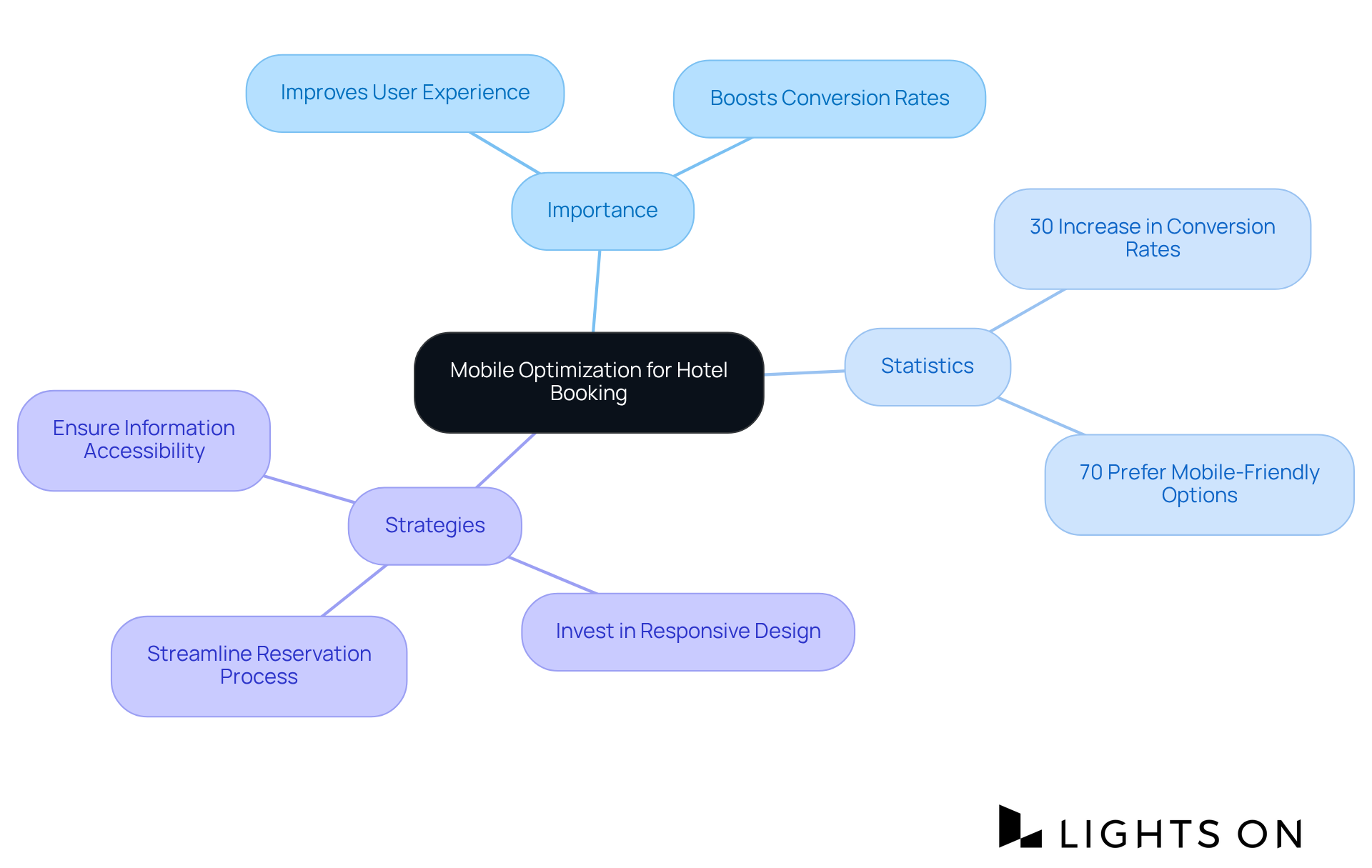
Automation features within a hotel booking system significantly enhance operational efficiency. By automating routine tasks such as confirmation emails, payment processing, and inventory updates, a hotel booking system can help accommodations drastically reduce manual workloads and minimize the risk of errors.
For instance, the implementation of Hotelogix PMS has resulted in a 37% enhancement in operational efficiency for establishments like Hotel Heranya, which also reported a 20% rise in revenue after its adoption. This efficiency not only but also allows teams to focus on delivering outstanding visitor experiences.
As Joe Vargas, SVP and General Manager for Hospitality, aptly notes, "Guests want technology to enhance their experiences, not detract from them." Consequently, accommodations can achieve greater traveler satisfaction and loyalty, with over 80% of individuals expressing a desire for personalized experiences facilitated by technology.
Furthermore, automation reduces the likelihood of overbooking and mismanagement, as evidenced by Fullerton Manor Inn, which has experienced zero overbooking issues since implementing its PMS. Additionally, Fullerton Manor Inn has seen a 30% increase in revenue, further emphasizing the financial benefits of automation.
By adopting automation, accommodations position themselves to thrive in a competitive environment, ensuring they meet and exceed evolving visitor expectations.
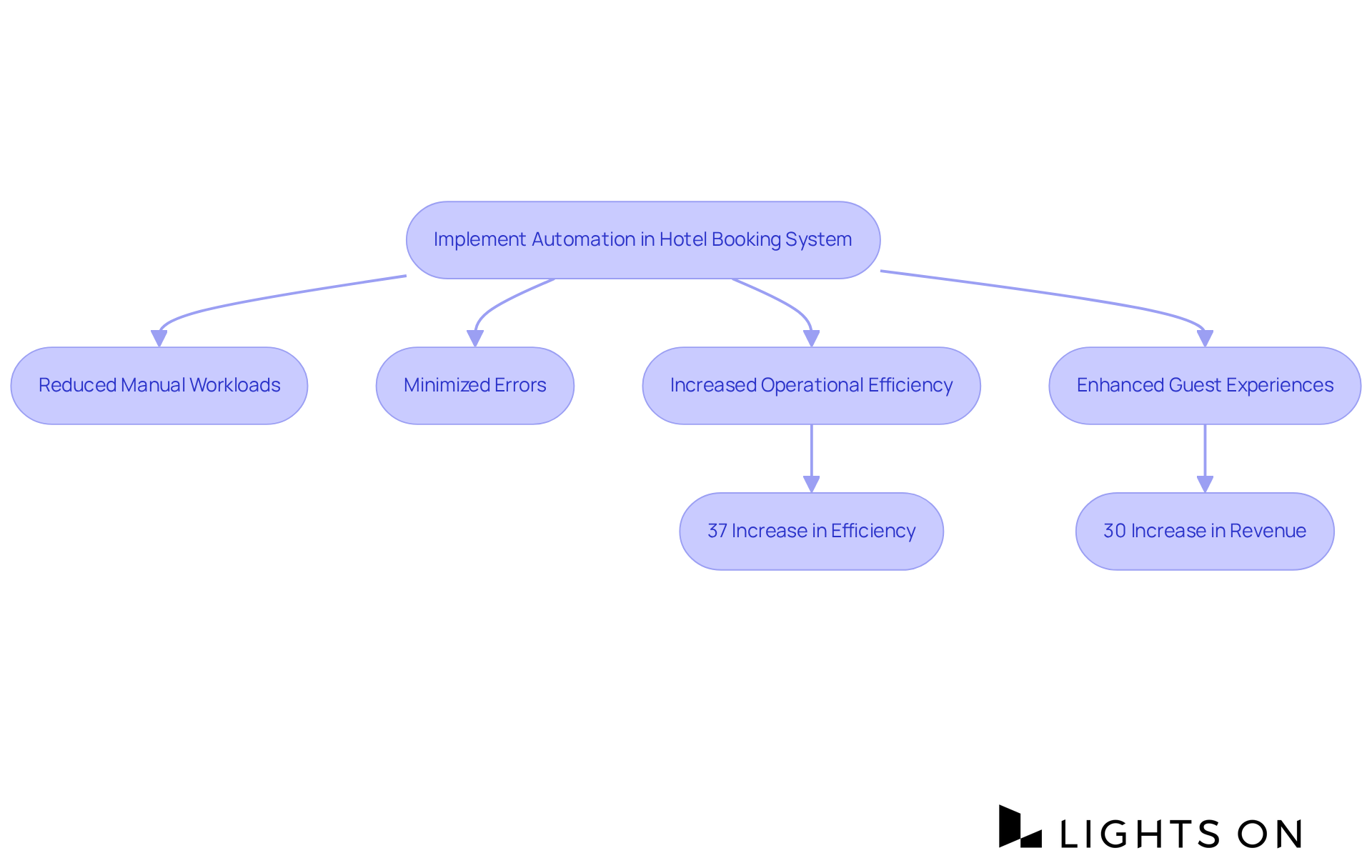
A hotel booking system, equipped with robust reporting and analytics features, empowers managers to make data-driven decisions. By examining reservation trends, guest demographics, and revenue performance, accommodations can pinpoint opportunities for enhancement and refine their pricing strategies. These insights are invaluable for , ensuring that accommodations remain competitive in a dynamic market. Furthermore, leveraging this data not only improves operational efficiency but also positions establishments to adapt swiftly to changing consumer preferences.
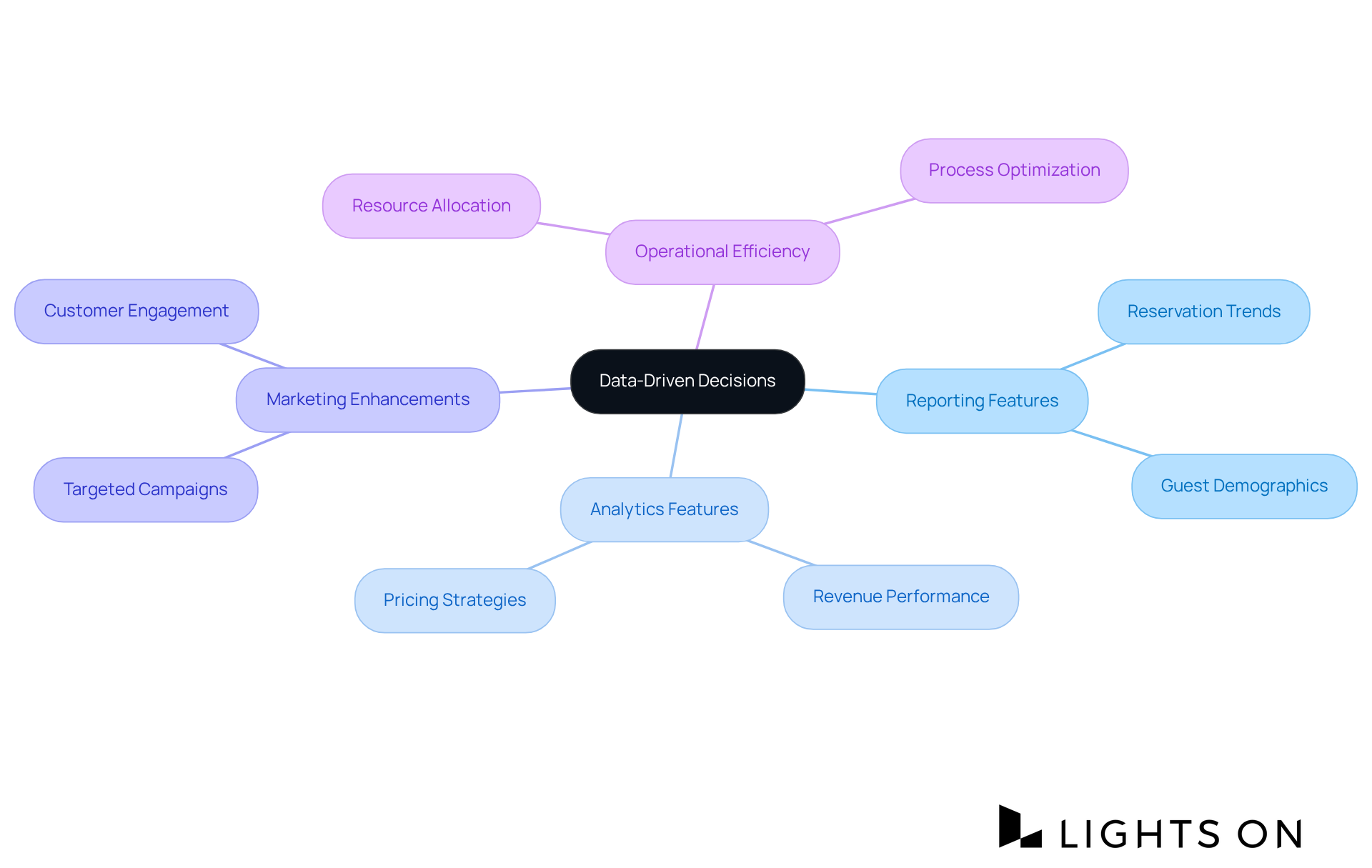
Efficient customer assistance and thorough training are vital for the success of any accommodation reservation platform. When personnel are well-educated in utilizing these tools, they can unlock their full potential, resulting in improved operational efficiency. Ongoing support is crucial for resolving issues promptly, allowing staff to focus on delivering exceptional guest experiences.
A reservation platform that prioritizes strong training and reliable customer assistance not only enhances usage but significantly boosts overall lodging performance. Statistics indicate that 74% of consumers are more likely to repurchase if they receive support in their own language, underscoring the necessity of multilingual training and support in cultivating customer loyalty.
Furthermore, accommodations that invest in digital training programs experience improved employee retention and satisfaction, as staff feel more capable and engaged in their roles. By equipping staff with essential skills and knowledge, establishments can ensure that their booking systems are utilized effectively, maximizing revenue opportunities and enhancing guest satisfaction.
It is also critical to recognize that 60% of travelers switch brands after just 1-2 negative service experiences, highlighting the imperative for effective training and support to retain customers. As emphasized by industry experts, "It’s time to stop treating customer service as an afterthought and start treating it as a revenue enabler." This perspective highlights the in hospitality operations.
However, hotels must also be cognizant of potential risks associated with digital training, such as employee resistance and low engagement, which can impede the effectiveness of training initiatives. Incorporating insights from case studies can further illustrate the practical application of these concepts, demonstrating how effective training and support can lead to enhanced customer experiences and operational success.
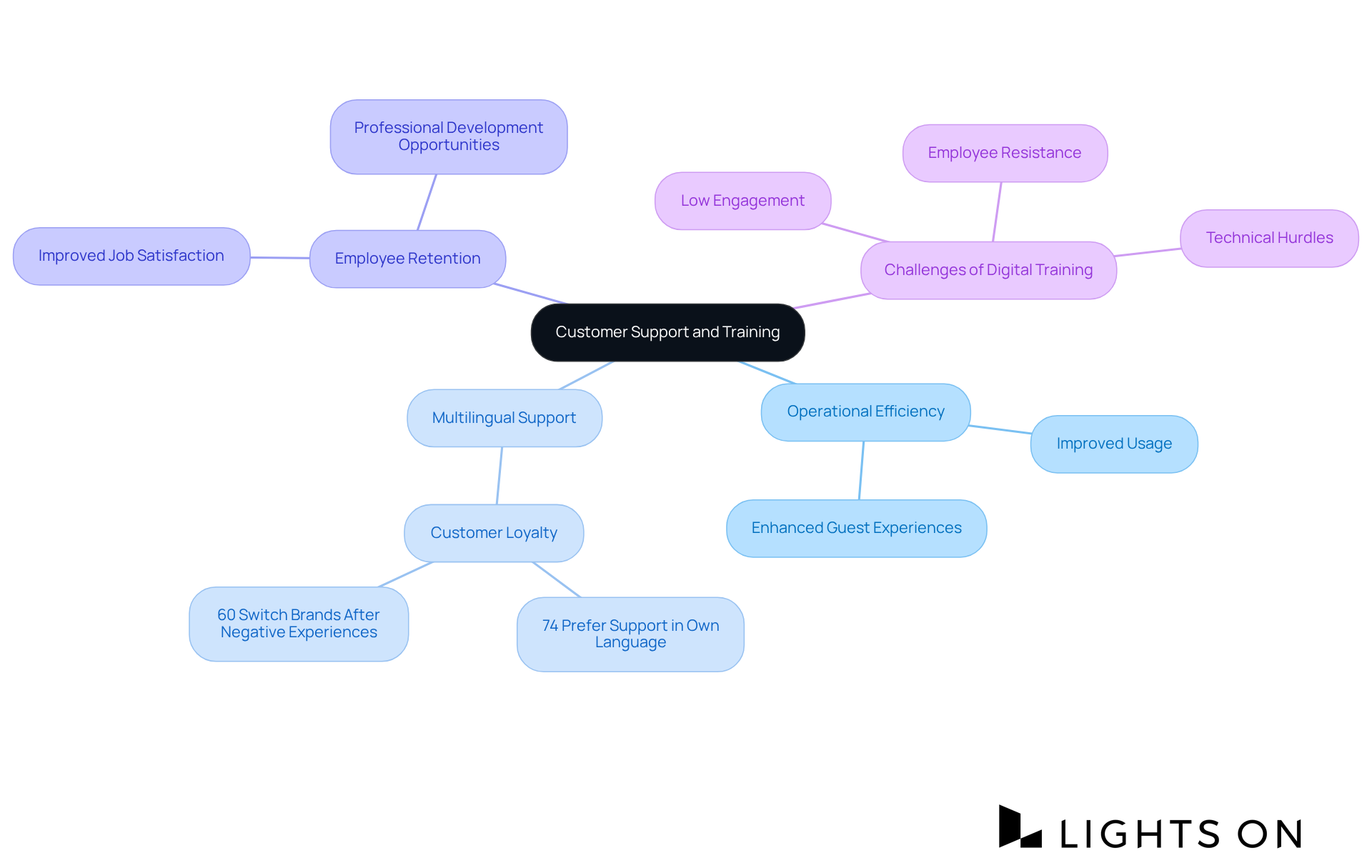
The essential features of a hotel booking system are pivotal for optimizing operations and enhancing guest experiences in the hospitality industry. By integrating advanced functionalities such as revenue management solutions, secure payment processing, and real-time availability management, hotels can significantly improve their operational efficiency and financial performance. These features not only streamline processes but also cater to the evolving needs of travelers, ensuring that accommodations remain competitive in a dynamic market.
Key insights from the article emphasize the importance of automation, data collection, and mobile optimization in driving customer satisfaction and loyalty. By leveraging data analytics and marketing tools, hotels can personalize their services and create targeted promotions that resonate with guests. Furthermore, the integration of booking systems with property management systems is crucial for maintaining accurate inventory and enhancing overall operational coherence.
In a landscape where guest expectations are continually rising, the significance of adopting a comprehensive hotel booking system cannot be overstated. Establishments that prioritize these essential features position themselves to thrive, not just in terms of revenue, but also in cultivating lasting relationships with their guests. Embracing these innovations will ultimately lead to a more robust hospitality experience, fostering loyalty and encouraging repeat visits.
What are the key components of Lights On's revenue management solutions for hotel booking systems?
The key components include pricing optimization, demand generation, and market trend analysis, all designed to enhance financial performance.
How is pricing optimization important for accommodations?
Pricing optimization is vital as it allows accommodations to dynamically adjust their pricing strategies in real-time, improving competitiveness and maximizing revenue streams.
What is the projected revenue for accommodation rooms in 2025?
The projected revenue for accommodation rooms in 2025 is $197.48 billion.
How has occupancy rate changed in the hospitality sector?
Occupancy rates have increased by 17.6% since the previous year, demonstrating the effectiveness of strategic pricing.
What techniques are essential for effective pricing optimization?
Essential techniques include competitor rate tracking and tailored pricing based on customer segmentation.
Why is secure payment processing important for hotel reservations?
Secure payment processing enhances visitor confidence by ensuring that sensitive payment information is encrypted and safeguarded, significantly reducing the risk of fraud.
How can secure payment systems impact booking conversion rates?
Secure payment systems can enhance booking conversion rates by up to 30%, as they build trust in the payment process.
What technologies are improving secure payment processing?
Advancements such as EMV chip technology, which generates one-time-use codes, and multifactor authentication (MFA), which requires multiple forms of identification, are improving secure payment processing.
What role do integration capabilities play in hotel booking systems?
Integration capabilities are crucial as they allow hotel booking systems to connect with property management systems (PMS), facilitating real-time updates on room availability, pricing, and visitor information.
How does effective integration help accommodations?
Effective integration mitigates the risk of overbookings, enhances operational efficiency, and helps deliver a better guest experience, which is vital for attracting and retaining clients.
Why is it important for hotels to evaluate their payment gateway options?
Evaluating payment gateway options is important to ensure they meet security standards, which is crucial for maximizing customer satisfaction and loyalty.
Transform your group booking strategies with Lights On and watch your occupancy soar.